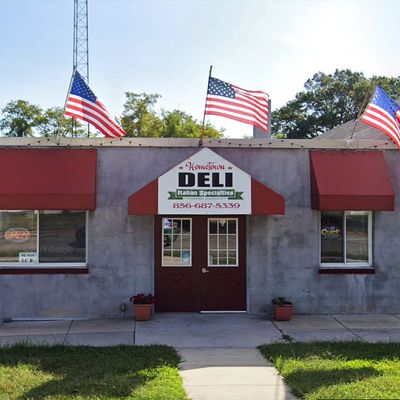
By deli standards, Your Hometown Deli in Paulsboro, N.J., is not a very successful one. Then again, Your Hometown Deli is not your ordinary deli, nor does it seem to be much of a deli at all.
The deli’s parent company, Hometown International, whose operations consist entirely of the single New Jersey deli, is a publicly traded company valued at nearly $100 million. The valuation is remarkable considering that in the first three months of this year, the deli made just $5,305 in sales, according to a financial report Hometown International filed last week. Technically, the deli company is an over-the-counter stock — the kind traded by Leonardo DiCaprio’s character in The Wolf of Wall Street, often known as penny stocks. But Hometown is not exactly a penny stock; its shares traded as high as $14.50 apiece before it was delisted by the OTC Markets Group in April. Now, demoted to a lower class of stocks called pink sheets, known for being inherently risky, its shares last changed hands at just over $12, despite OTC Markets labeling it with a “buyer beware” warning denoted with the symbol of a skull and crossbones.
At first glance, you could chalk up that dismal first-quarter performance to perhaps a slow recovery from the pandemic: The deli is around the corner from the local high school, which is still on a hybrid-learning model with virtual schooling, and shares the property with a sports practice center where the school’s famous wrestling team trains — though the team’s season didn’t start until late March. But even in normal times, in 2019 — the year in which Hometown’s stock began trading on the public markets — the company brought in under $22,000 in sales, a third less than it made even the previous year, in 2018. Each of those years, the deli company somehow lost more than $100,000.
This set of facts has some observers wondering whether Hometown really wants to be a deli at all, or whether it’s just masquerading as a sandwich shop to keep up appearances that it’s a functioning business. In other words, they speculate, Your Hometown Deli may be a stalking horse in a kind of accounting game aimed at fast-tracking another — most likely foreign — company to the U.S. public markets, all while flying under the radar of regulators.
By the end of 2019, Hometown was already mulling getting out of the delicatessen trade. “We may decide to exit our existing business,” the company wrote in its annual report for that year, saying it might explore creating a new business entirely, “or target an existing business for acquisition, without restriction to any specific business, industry, or geographical location.” By the fall of last year, it had made that pursuit a prime focus. In an amended registration statement with the SEC, it warned that its “future success is highly dependent on the ability of management to locate and attract a suitable acquisition,” and that while Hometown’s management expected to spend “very limited time” searching for such a deal, the company’s chairman, Peter Coker Jr., “intends to devote his full time to seeking a business combination for the company.”
Hometown offered an update on its quest in its quarterly earnings report in late May, saying it “continues to seek and investigate and, if such investigation warrants, will engage in, a business combination with a private entity whose business presents an opportunity for our shareholders.” It appears to be casting a wide net: “We may acquire or combine with a venture that is in its preliminary or early stages of development, one that is already in operation or one that is in a more mature stage of its corporate existence,” the company wrote.
To be clear, people have eaten the food at Your Hometown Deli. Its Facebook page has 19 reviews, which give the deli an average rating of “5 out of 5.” But to make as little as $22,000 in revenue for an entire year, Your Hometown Deli would’ve had to only have sold slightly more than five of its “amazing,” “genuinely delicious” cheesesteaks a day, or less than one an hour — and nothing else at all.
Some notable context here is that the people who until two weeks ago were running Hometown International had other full-time jobs. Paul Morina, who served as Hometown International’s president, CEO, and CFO since its inception in 2014, is also the principal of the nearby Paulsboro High School, and has been head coach of its champion wrestling team since 1986. The other former top executive is a math teacher at the same school. The company fired both of them from their positions in mid-May, according to a regulatory disclosure, without offering a reason, though they are still in charge of the deli itself.
The shake-up came after a maelstrom of attention turned on Hometown International when the hedge fund manager David Einhorn, of Greenlight Capital, mentioned the deli company in his quarterly letter in mid-April, pointing out the large mismatch between the deli’s sales and its market valuation. Regulators, Einhorn warned, “appear to be neither present nor curious,” seemingly hinting at something potentially awry with the stock.
Days later, a report from CNBC revealed a laundry list of legal problems involving people connected to Hometown. That included the lawyer, Gregg Jaclin, who originally filed the documents for the company’s first stock offering in 2015. Jaclin was disbarred last year after pleading guilty to obstructing justice related to Securities and Exchange Commission charges of “running a fraudulent shell-factory scheme,” involving taking “sham companies” public and then selling them. Meanwhile, one of Hometown’s largest shareholders, Peter Coker Sr. — who is also the father of the company’s Hong Kong-based chairman, Coker Jr. — had been accused of various crimes, from embezzlement to fraud to indecent exposure in front of minors. (Neither the Cokers, Morina, Jaclin, nor anyone else at the company have responded to requests for comment.)
But then, amid all the allegations, a stranger thing happened. Hometown’s stock barely moved. Over the following week, it ticked down less than 10 percent but still maintained a valuation around $95 million. Generally, when an influential investor and reputable news outlets raise the specter of fraud at a company, the stock will take a hit, and certainly, many other investors expected Hometown’s valuation to collapse. In the two weeks after Einhorn’s letter, the number of Hometown shares being shorted multiplied some 46 times.
The fact that Hometown’s valuation still held mostly steady raised more red flags at the OTC Markets Group, where the stock was publicly quoted. This led to Hometown’s delisting, according to people familiar with that market. Still, only the SEC can fully suspend trading in the stock, and so far the regulator has not taken action nor accused Hometown of any wrongdoing, though OTC market experts expect an investigation is likely.
One obvious question around Hometown’s inflated valuation is whether insiders at the company have been bidding up the stock for their own gain — what’s known as a pump-and-dump scheme. This would involve trading shares to each other at higher and higher prices with the aim of eventually dumping them on gullible retail investors. But, if that were the real story, why has the dump never materialized? Why have hardly any shareholders been selling?
There have also been suspicions that Hometown may be playing, or at least attempting to play, a shell-company game similar to the one Jaclin was caught up in. Shell companies — which the SEC defines as companies with nonexistent or “nominal” business operations and little to no assets — are, in general, legal. Still, the SEC requires that companies disclose whether or not they are a shell company and places additional rules on them to cut down on fraud and abuse of securities laws, for which shell companies have historically been used. At the end of March, the SEC reminded investors that SPACs — special purpose acquisition vehicles that have become over the past year a trendy way for companies to go public — are themselves shell companies, and therefore subject to certain restrictions, as part of a crackdown by the agency on the SPAC boom. In the past, companies flagged with OTC Markets’ skull-and-crossbones warning (whether on suspicion of potential fraud or other fishiness) have later been prosecuted by the SEC, though it can take years.
A closer look at Hometown’s financial disclosures reveals an incestuous web of connections across various shell companies, or quasi-shell companies, with little to no revenue. For example, despite the deli company’s precarious financial position, it made a loan of $150,000 in February of this year to a shell company called Med Spa Vacations, which sought, unsuccessfully by its own admission, to market “health and wellness vacations”; it’s now looking to merge with another business, according to financial filings. Both Hometown and Med Spa Vacations share a large investor in common: Peter Coker Sr.
Hometown International, on its regulatory documents, says it’s not a shell company. But when the company first sought to register with the SEC in 2015, the regulatory agency did not agree with that assertion, writing in a letter that the company’s activities “do not appear to constitute more than nominal operations.”
So, given this very weird collection of circumstances, what is actually going on? I consulted a handful of Wall Street and market veterans, and though they weren’t eager to be quoted on it, the general opinion was that the sandwich-selling operation is merely a bare-minimum façade designed to disguise the company’s ultimate intentions — to act as a vessel for another company (possibly one in Asia) to merge into, at which point the deli business would be jettisoned: a backdoor SPAC of sorts.
This idea is supported by some new reporting from the New York Times, which published a long story about the deli on Wednesday. The Times tracked down someone involved in the hunt for a merger partner for Hometown. Manoj Jain, a Hong Kong-based hedge fund manager, said that his firm had invested $2.5 million in Hometown after Coker Jr. brought it to his attention as a good candidate for one of these backdoor SPACs — a transaction often known as a “reverse merger.” Since then, Jain has been searching for a target which would then take over Hometown, subsuming the deli company into whatever new business took possession of its stock-market listing and American incorporation. Still, as the Times explains, reverse mergers typically involve a takeover of a shell company, which, again, Hometown denies being.
Why go through so much trouble to sell a few sandwiches in an apparent effort to prove it’s more than a shell? That remains a bit of a mystery, but if Hometown can avoid the designation of a shell company while it waits to be taken over, it will be subject to fewer SEC restrictions on those sorts of companies. Then again, its chances of escaping the attention of the SEC until then seem to be dwindling by the day.






























